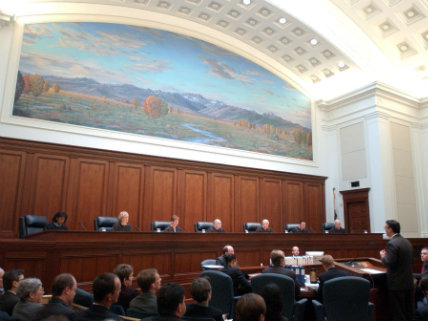Public Workers Can Get Pensions Only for Time They Actually Worked, Court Rules
Before 2011 reforms, state workers could purchase an additional five years of service time to boost pension payouts and retire earlier.

In 2011, when Gov. Jerry Brown signed a bill closing a series of pension-boosting loopholes in California, he offered a comment that should have been anything but controversial.
"Pensions are intended to provide retirement stability for time actually worked," the governor said.
"Time actually worked" being the key part of the sentence. That's because one of the reforms Brown signed into law did away with a practice known as "airtime purchases," in which public workers in California were able to boost their pensions by purchasing an additional five years of service time without having to actually work for those years.
In California, like in most other cities and states where defined benefit pensions are offered to public employees, a worker's pension is based on a formula that takes into account the worker's final salary (sometimes an average of his or her salary over the last five years or so) and the amount of time working in the public sector. Play around with either of those two numbers and an employee can end up with a much larger pension than the rules suggest he or she should.
There's no shortage of stories about public workers "spiking" their pensions by boosting that first figure, but in California it was possible, until 2011, to artificially inflate the second figure too. With an "airtime purchase," an employee could work until age 60 but retire with a pension based on a formula that assumes he or she worked until age 65.
Unions didn't share Brown's opinion that pensions should reflect "time actually worked" and sued the state in an effort to maintain the sweet pension perk. They pointed to longstanding set of court precedents—collectively known as "The California Rule"—that prohibit state and local governments in the state from reducing pension promises to current workers.
It's been five years since Brown signed those reforms into law, but last month the Third Division of the First District Court of Appeals unanimously agreed that the state was within its authority to end "airtime purchases," the Orange County Register reports.
"While plaintiffs may believe they have been disadvantaged by these amendments, the law is quite clear that they are entitled only to a 'reasonable' pension, not one providing fixed or definite benefits immune from modification or elimination by the governing body," the appeals court ruled.
The ruling comes on the heels of an August ruling from the same court that tossed out a union-backed challenge to pension benefit changed imposed on public workers in Marin County, California. The county decided to stop allowing workers to cash-in unused vacation days, sick days, and other benefits in exchange for a larger pension payout—that's a form of "spiking" that alters the first figure in the pension formula.
In that case, the court ruled that concluded pension benefits can be reduced if they are determined to be "unreasonable. An appeal is heading to the California Supreme Court later this spring (a date for oral arguments has not been set), in what could be a major blow to public sector unions in California and an important signal to courts in other states.
On its own, the new ruling does not mean anything beyond the scope of the specific case in question, but taken together with the ruling in last year's Marin County case, it's can be seen as part of a developing trend of courts taking a skeptical look at the so-called "California Rule."
Like the California Rule itself—which originated there but has been written in state law in 12 other states over the past few decades—what happens with these legal challenges is unlikely to state in California.
As I wrote in December, denting the power of the California Rule would be a significant step towards helping cities and states get out from under the crushing debt of future pension bills. Increasingly, it looks like courts will get to be the final arbiter of what can and cannot be paid.
The legal challenge over Brown's prohibition on airtime purchases demonstrates how the tide is turning against public workers and the unions that represent them. Perks like that are hardly available to private sector workers—go ahead and ask your boss to make five years' worth of contributions to your 401(k) without you having to actually work those years and see what happens—but unions have been gaming the pension system for years without much resistance. Indeed, Brown was only pressured into closing that loophole because the state's pension fund was in such dire straits that something had to be done.
That unions challenged that reform seems tone-deaf, but they would surely argue that they are only sticking up for their members' best interests. The important detail here is that some courts are no longer going along with it.
